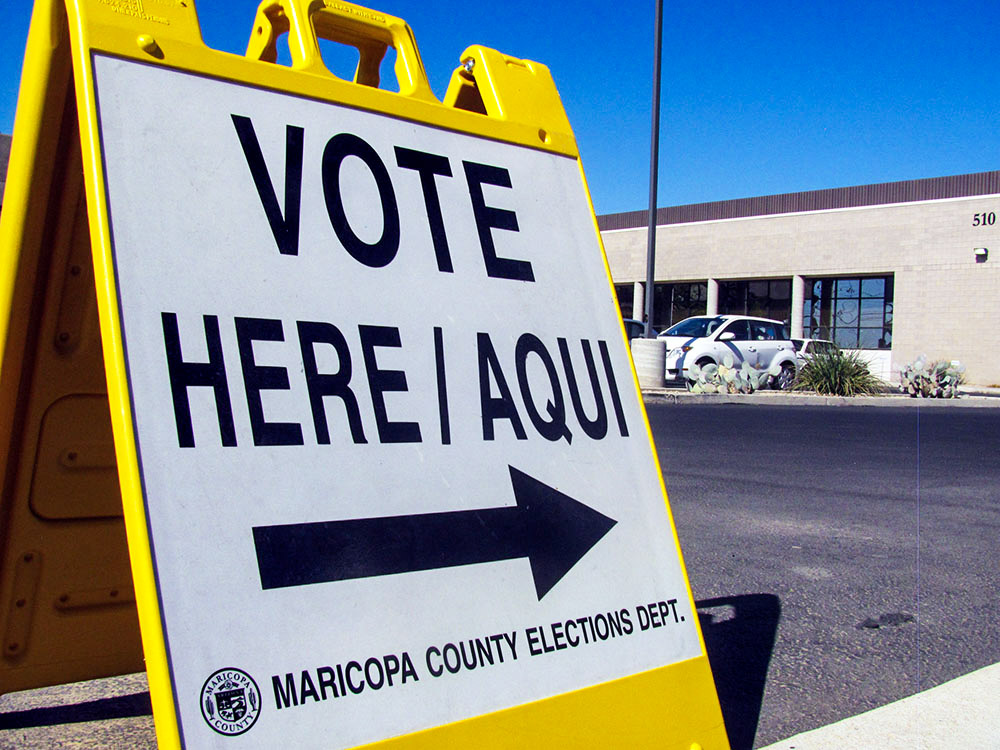Indianz.Com > News > Cronkite News: Pascua Yaqui Tribe loses voting rights case

Judge denies early Pascua Yaqui voting site, ending years-long feud
Monday, October 26, 2020
Cronkite News
WASHINGTON – The Pascua Yaqui Tribe will not get the early voting location it has been asking for since 2018, after a federal judge flatly denied the request he said would overburden an elections office “already stretched to its breaking point.”
The ruling
by U.S. District Judge James Soto Thursday night was the second blow to Native voting rights advocates in as many weeks. A federal appellate court last week rejected a request to allow extra time for mail-in ballots from the Navajo Nation.
Pascua Yaqui officials said they were disappointed by Soto’s ruling, but were glad they had brought the case.
“Pascua Yaqui voters’ voices deserve to be heard – whether it’s one vote or a thousand votes,” said Pascua Yaqui Tribal Chairman Peter S. Yucupicio in a statement Thursday night.
Pima County Recorder F. Ann Rodriguez, the subject of the suit, called it “unfortunate that it came to” a lawsuit, but said she stands by her decisions.
“Pima County has 9,000 square miles, so you got to ration out” early voting locations based on various factors, she said Friday.
The tribe filed its suit against Rodriguez last week in an attempt to force her to reinstate an early voting site on its reservation in southern Tucson, the latest turn in a two-year long dispute that started when Rodriguez got rid of the location six weeks before the 2018 election. Tribal officials argued that it can take tribal members up to two hours, round trip, to reach the closest early voting location since many tribal members have to travel by bus. Early voting is particularly urgent in the face of COVID-19, which has disproportionately affected Native American communities, the tribe argued. Several tribal members testified before Soto this week on “the particular burden that closing this early voting site caused.” The tribe sought a week of early voting, emergency voting the weekend before Election Day and a ballot-drop location. “Early voting is especially important this year for Native American voters in Pima County, who … strongly prefer to vote in person rather than by mail,” the tribe said in its motion for a preliminary injunction. But Soto said the tribe had not proved that the potential burden on tribal voters outweighed the burden Rodriguez’s office would face if she was ordered to reopen the early voting site. “The recorder’s office is extremely busy, and is currently dealing with numerous moving parts leading up to the election, and is already stretched to its breaking point,” Soto wrote.A federal court has declined to reinstate the only early voting site for the Pascua Yaqui Tribe in #Arizona. Although they will not have an early voting site, members of the Tribe are preparing outreach to ensure voters have a plan to #vote.https://t.co/epPfSLCw7b
— Campaign Legal Center (@CampaignLegal) October 23, 2020

Note: This story originally appeared on Cronkite News. It is published via a Creative Commons license. Cronkite News is produced by the Walter Cronkite School of Journalism and Mass Communication at Arizona State University.
Related Stories
Native America Calling: Native voting access update (October 16, 2020)Cronkite News: Pascua Yaqui Tribe denied early voting site (September 22, 2020)
Search
Filed Under
Tags
More Headlines
Press Release: National Museum of the American Indian hosts Native art market
AUDIO: Sea Lion Predation in the Pacific Northwest
Native America Calling: Tribal colleges see an uncertain federal funding road ahead
Native America Calling: Short films taking on big stories
Native America Calling: Advocates push back against new obstacles to Missing and Murdered Indigenous Relatives momentum
Native America Calling: For all its promise, AI is a potential threat to culture
NAFOA: 5 Things You Need to Know this Week (November 24, 2025)
Chuck Hoskin: Cherokee Nation invests in rural transportation
Native America Calling: Native candidates make strides in local elections
National Congress of American Indians returns incumbents and welcomes newcomers to leadership
National Congress of American Indians chooses leadership at big convention
‘Not voting is still a vote’: Native turnout drops amid changes in political winds
Native America Calling: Indigenous voices speak up, but have little clout at COP30
‘It’s bull****’: Indian Country confronts challenges at largest inter-tribal conference
Native America Calling: The constant burden on tribal hunters to justify their treaty rights
More Headlines
AUDIO: Sea Lion Predation in the Pacific Northwest
Native America Calling: Tribal colleges see an uncertain federal funding road ahead
Native America Calling: Short films taking on big stories
Native America Calling: Advocates push back against new obstacles to Missing and Murdered Indigenous Relatives momentum
Native America Calling: For all its promise, AI is a potential threat to culture
NAFOA: 5 Things You Need to Know this Week (November 24, 2025)
Chuck Hoskin: Cherokee Nation invests in rural transportation
Native America Calling: Native candidates make strides in local elections
National Congress of American Indians returns incumbents and welcomes newcomers to leadership
National Congress of American Indians chooses leadership at big convention
‘Not voting is still a vote’: Native turnout drops amid changes in political winds
Native America Calling: Indigenous voices speak up, but have little clout at COP30
‘It’s bull****’: Indian Country confronts challenges at largest inter-tribal conference
Native America Calling: The constant burden on tribal hunters to justify their treaty rights
More Headlines